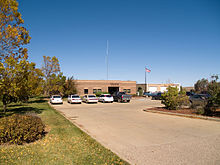Dunn County, North Dakota
| Dunn County, North Dakota | |
|---|---|

Dunn County Courthouse - Manning, North Dakota
|
|
 Location in the U.S. state of North Dakota |
|
 North Dakota's location in the U.S. |
|
| Founded | February 10, 1908 |
| Seat | Manning |
| Largest city | Killdeer |
| Area | |
| • Total | 2,082 sq mi (5,392 km2) |
| • Land | 2,008 sq mi (5,201 km2) |
| • Water | 74 sq mi (192 km2), 3.5% |
| Population (est.) | |
| • (2015) | 4,646 |
| • Density | 1.8/sq mi (1/km²) |
| Time zones |
Central: UTC-6/-5 (northern portion) |
|
Mountain: UTC-7/-6 (southern portion) |
|
| Website | www |
Dunn County is a county located in the U.S. state of North Dakota. As of the 2010 census, the population was 3,536. Its county seat is Manning. The county was created by the 1883 Dakota Territory legislature and named for John Piatt Dunn, who opened the first drugstore in North Dakota and was a civic and commercial leader during the early history of Bismarck. The county government was first organized on February 10, 1908.
According to the U.S. Census Bureau, the county has a total area of 2,082 square miles (5,390 km2), of which 2,008 square miles (5,200 km2) is land and 74 square miles (190 km2) (3.5%) is water. It is the fifth-largest county in North Dakota by total area.
Dunn County is somewhat unusual among western North Dakota counties. Like other counties in the region, it has both prairie and badlands areas. Located in the northwest part of the county are the Killdeer Mountains, which are more accurately described as hills. These hills help create a mini-ecosystem on the southern edge of the Little Missouri badlands, which has a greater abundance of aspen forests and wildlife than is typically found in southwestern North Dakota.
The northwest corner of the county, northwest of the Killdeer Mountains, features many square miles of bur oak forest, mainly on the north-facing slopes of the hills. Bur oak and quaking aspen, though native to North Dakota, are sparse in western North Dakota, with Dunn County being a notable exception.
As of the census of 2000, there were 3,600 people, 1,378 households, and 986 families residing in the county. The population density was 2 people per square mile (1/km²). There were 1,965 housing units at an average density of 1 per square mile (0/km²). The racial makeup of the county was 86.58% White, 0.03% Black or African American, 12.44% Native American, 0.08% Asian, and 0.86% from two or more races. 0.75% of the population were Hispanic or Latino of any race. 43.2% were of German and 16.6% Norwegian ancestry.
...
Wikipedia
